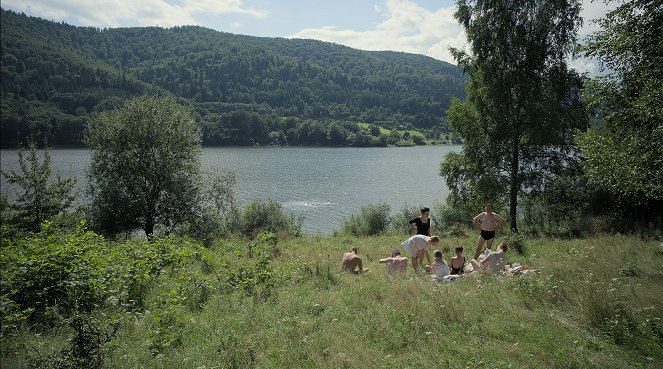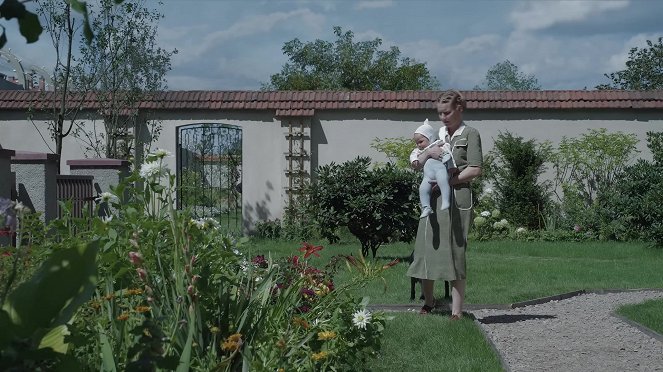Directed by:
Jonathan GlazerScreenplay:
Jonathan GlazerCinematography:
Łukasz ŻalComposer:
Mica LeviCast:
Sandra Hüller, Christian Friedel, Ralph Herforth, Freya Kreutzkam, Max Beck, Ralf Zillmann, Imogen Kogge, Stephanie Petrowitz, Marie Rosa Tietjen (more)VOD (2)
Plots(1)
The commandant of Auschwitz, Rudolf Höss, and his wife Hedwig, strive to build a dream life for their family in a house and garden next to the camp. (SF Studios Fin.)
Videos (4)
Reviews (10)
Jonathan Glazer is again powerfully creative and artsy. In The Zone of Interest, we don’t see a single Auschwitz prisoner in the film or any of the atrocities perpetrated behind the walls of the camp. The minimalistically staged but effectively arranged action takes place inside the Hösses’ villa and in their garden, which is bordered by the wall, over which the tops of the concentration-camp barracks loom. Höss dutifully goes to “work” and spends his free time with his family. Höss’s wife enjoys the flowers in the garden. Their children play by the swimming pool. Höss occasionally receives a visitor on business, such as engineers with a design for a more efficient crematorium. Sometimes someone brings them a bag of nice clothes to pick through... The whole time, we hear the distant droning of the death factory in operation, sometimes people screaming, dogs barking, gunfire. Black clouds of ash fill the sky. The Höss children’s perception of the world outside the house is also evident in small nuances. The little girl’s nocturnal dreams in black-and-white inverted images are the most impressive of the artistic ornaments with which the film is packed to the maximum satisfaction of the festival viewer. The scene with Höss on the stairs with the dark empty corridors is brilliant and the highlight of the film in my opinion. The Zone of Interest is a different view of the Holocaust, with the most unpleasant music you have ever experienced accompanying the closing credits. This puts Jonathan Glazer in the company of masters like Michael Haneke and Yorgos Lanthimos. [Cannes FF]
()
The Zone of Interest depicts the concentration camps and the Holocaust from a truly novel point of view, and this is why it will not be lost among the thematically close films. Jonathan Glazer's film does not primarily target the audience's eyes, but rather their ears and general awareness of the horrors of war: at first glance we see the ordinary life of an ordinary family, but on second viewing (or listening) and placing the film in the context of the time, it evokes extremely uncomfortable feelings. On the one hand we have an idyllic, almost 'Garden of Eden', on the other (behind the fence) we can hear screams and gunshots, while in the distance we watch the smoke (of death). To the sound of a sometimes literally poignant musical score, we witness that pure evil can take on a completely mundane, innocent form. As in Anatomy of a Fall, Sandra Hüller gives a supremely impressive performance and I'm curious to see what roles await her in the future. Last but not least, I praise the play with negative imagery, which contributed to the film's unpleasant atmosphere. Perhaps only the closing documentary insert left me with mixed feelings.
()
We have seen the horrors that took place in concentration and extermination camps many times on the cinema screen, but this time we take an unconventional look from the other side of the wall, at the life of an Auschwitz commander and his family. Well, it's a disgustingly perfect idyll: a lovely home, a beautiful garden with a pool, a house full of servants; the Höss don't lack for anything. What is happening behind the wall is presented to the viewer only in small "icy" details: the young son playing in the beautiful flowering garden and behind him in the house we see only the steam rising from a train arriving at Auschwitz; the family celebrating a birthday in the garden and behind them we see the incinerator in full swing; they are bathing in the river and suddenly ashes start falling down on them. We all know very well what that means, Jonathan Glazer is counting on it, and he manages to create a perfectly chilling contrast. It also presents a picture of a happy family, which is something I thought about many times in the past because I always found it very controversial. We know all too well what monsters the SS could be, but at the same time they could be, and probably were, loving fathers, something that is beautifully portrayed here. Rudolf Höss is a likeable dad (if it weren't for his uniform, he wouldn't be so different from your friends), but then he picks up the phone and starts figuring out how to streamline the final solution to the Jewish question; at a social event his wife asks him who were the people there and he answers that he doesn’t care about the people, that he was thinking how to gas everything, but it was logistically difficult – that was quite hard to stomach. It took me a while to get used to the way the film is shot, it feels a bit documentary-like, and by the end credits I almost ripped my ears off from the accompanying "music" in agony, but it was a very powerful experience. [Festival de Cannes 2023]
()
Scenes from National Socialist married life and a film whose concept is drawn so tight that it left me feeling oddly indifferent. The idea of transforming a death factory into a 2D backdrop, which Łukasz Żal’s camera literally pushes through the depth of field to the Hösses’ “garden of paradise” is suffocating and oppressive, but it also leads to a certain monotony and risks making the viewer get used to it just as the characters get used to the ubiquitous stench, screaming and moaning. The central couple cannot be humanised to a sufficient extent to form a psychological counterpoint to the horrors of the Holocaust, so I found that there was something mechanical in the Hösses’ routines that made it easier for me to disconnect from the urgency of Glazer’s world. The banality of evil is precisely and literally illustrated. I was reminded of Markus Schleinzer’s similarly conceived and distanced film Michael, which, however, started to be truly impressive at the moment when the character of the blasé paedophile rapist gets an adversary in the form of the victim in a powerful reverse shot. Glazer chooses a similar principle at the end, but in doing so, he breaks the fourth wall in a way that has more intellectual calculation than natural power. Was Höss aware of the moral implications of his actions or was he able to conceal them in the rhetoric of industrial production and historical necessity? This is where the possibilities of Glazer’s film reach their limit. In the ever-powerful deluge of “Holocaust porn”, The Zone of Interest is important for its differentness and its courage to change the perspective, to expose the viewer to the “cognitive dissonance” experienced by the direct perpetrators of evil. It is also an interesting reflection on the central ideological concept of Lebensraum, which in the portrayal of Frau Höss takes the form of a neat garden fertilised with the ashes of the dead. Nevertheless, I enjoy reflecting on the film from a distance significantly more than experiencing it directly on the screen. In that respect, I give preference to the concept of Son of Saul…and to reading the immensely monstrous The Kindly Ones, which went much deeper into the psyches of the architects of the Holocaust than The Zone of Interest.
()
Such is the daily routine of a family of ordinary, decent citizens. They grow kohlrabi and carnations in the garden, keep the house in perfect order, pet the dog and frolic in the swimming pool, and all this is provided by the head of the family, who goes to work every day in an exemplary manner and who - by the way - is the director of the most monstrous concentration camp. He is, again by the way, at work dealing with, for example, the more efficient incineration of Jews in ovens, and does it with the same emotional involvement as when you and your wife are deciding what to buy for dinner at the supermarket. And behind the walls of this middle-class family's property, behind those ominous walls, is a human-scale Mordor where the most monstrous acts against humanity are taking place, and you feel an immense oppression thanks to the ingenious sound work and the ominous visual details in the distance, such as the smoke from the ovens, or from the locomotives bringing in more and more human fuel. The film doesn't shove down your throat horrific imagery about how monstrous the Holocaust is, it does it on a subliminal basis, working with your subconscious, and that actually makes it all the worse. It made me sick, but at the same time I bow down to Jonathan Glazer for this bold cinematic experiment that says more about us humans than you'd expect.
()
Gallery (13)
Photo © A24



Ads